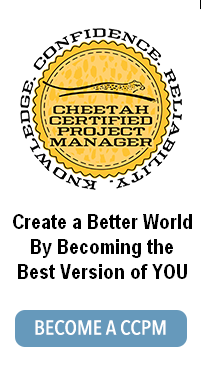High Performing Business – Project Teams – Completion
Michelle LaBrosse, CCPM, PMP, PMI-ACP, RYT
No one remembers what you start; they remember what you finish (and how well you finish it). What I’ve seen on various project teams, some people have a different definition of what “complete” means. Done means done in my book. It means the task for which you undertook is completely complete – no lingering lines of code to tweak, no messes to clean up, no door frames that still need painting, not one more box you still need to send to an event…. You never need to look at that project again done. If there is something more you want to do in the same vein, you start another project.
It is crucial to co-create clarity on what done means on project tasks – no matter the project – from events, to marketing promotions, to construction projects, to software development efforts. When I find myself in the sweep mode on a project (and sometimes this is literal as I’m cleaning up after a family member who was “helping” me with a construction project). I realize it is due to a lack of prior clarity on what “done” means and who is responsible for that level of “done.” I am a completion nut – so I like to keep my “done” level at the smallest level of value possible. This way I get to celebrate many “done’s” in my life.
What I realized studying agile methodology is my way of completing smaller projects fast was inherently agile. The focus of an “agile” managed project is on completing something of value (you or your customer can use) in the shortest amount of time with the least resources. I live in Alaska and I see many home sites constructed this way. First the landowner builds a tiny cabin they can live in (the value here they can live in it). It may only have walls, a roof, a window, door, and a wood stove. While it is primitive, it suffices to keep them warm and dry while they build their permanent home.
Completing smaller projects in shorter time frames also provides more flexibility for changing requirements. In the Alaska homesite example – you get to live on the land and assess the various ways you want to use the land while on site. You would have the opportunity to change where you would place the house, where you’d place doors, windows, decking, etc. When you give yourself the timing to make decisions in the right time frame to make the decisions, you create better longer term solutions. This happens when you complete the next logical phase of the project in the way and the timing that needs to happen.
Alignment on completion with the project team ensures you all finish the project the way you envision project completion. It seems so basic, yet it’s a basic principal many project team members overlook as they just assume they share the same vision of what done means.
We see a similar mis-interpretation of “done” with people who take other exam prep programs for the PMP exam as well. To Cheetah, done with a PMP exam prep course means our student passes the exam. Once that happens, then our work together is done. How you start a project can in fact predict how you will complete that project. If your project is to improve your career, earn the most prestigious (and profitable) professional credential you can get – become a Project Management Professional. Starting salaries for PMP’s are in the 80k range and those who hold the PMP for ten years or more, are the highest paid project managers with salaries over 150k. Start this project right by downloading the Cheetah Smartstart Guide for the PMP Exam.


